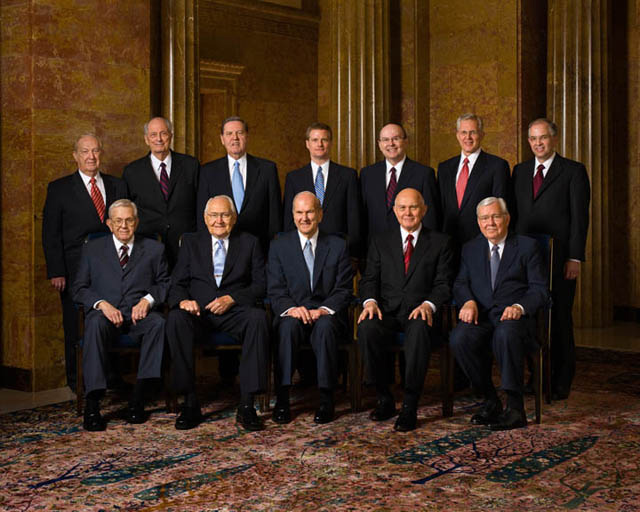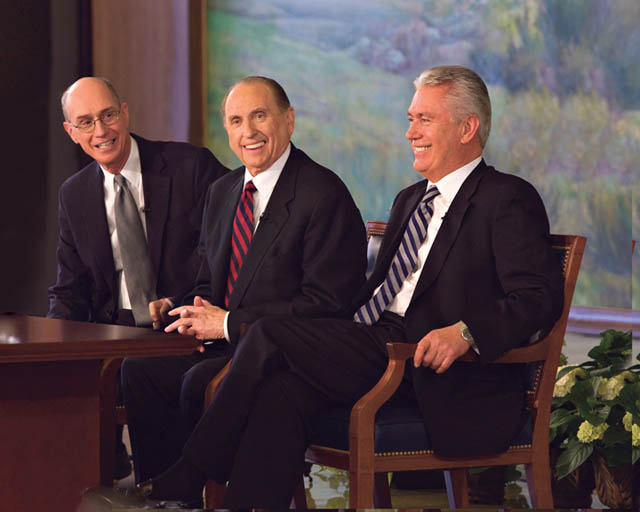 This is the seventh installment in a series of articles on Mormon prophets. The series is based on a talk given by Ezra Taft Benson, who was then a Mormon apostle. In the article, he outlines Fourteen Fundamentals in Following the Prophet.
This is the seventh installment in a series of articles on Mormon prophets. The series is based on a talk given by Ezra Taft Benson, who was then a Mormon apostle. In the article, he outlines Fourteen Fundamentals in Following the Prophet.
In this article, we are combining the next three points about following a Mormon prophet. They are combined because they are often related in terms of how people react to the teachings of a prophet. These three points are:
6. The prophet does not have to say “Thus Saith the Lord,” to give us scripture.
7. The prophet tells us what we need to know, not always what we want to know.
8. The prophet is not limited by men’s reasoning.
These three are connected because people often use them as reasons for not obeying the prophet. Mormon beliefs state that we are supposed to obey the teachings of God’s prophets, just as people of the Old Testament were supposed to obey their own living prophets. Of course, first, they are taught to find out from God if that person really is a prophet. Only God can tell us that.
When a Mormon prophet is acting in his capacity as a prophet, what he tells us is expected to be obeyed. So, for instance, if he’s watching football with his friends one day and says jokingly, “Everyone should be a Brigham Young University fan,” he is not speaking as a prophet, but as a private person. Clearly, that is an opinion, not a prophecy. However, if he is speaking in an official meeting and does not offer a disclaimer, he is speaking as the prophet. Recently, an apostle spoke at a Constitution Day celebration and began by saying he was speaking as an expert on the constitution (he is a former state Supreme Court judge) and not as an apostle. With that disclaimer in place, his words and thoughts were not binding on members. Words spoken in General Conference are later printed, after the speaker has had an opportunity to review them and make corrections. The printed versions are binding on Church members. It would make for very awkward talks if they had to keep saying, “Thus sayeth the Lord” after each new idea. It is the responsibility of each Mormon to understand when the Church is acting in an official capacity and to accept the teachings offered in official settings.
The second two points are that the prophet is not subject to fads or political correctness and is not required to tell us only things we will like. His responsibility is to God, not man. He is called to teach God’s words, and throughout the ages, God’s words have not always been popular, but they were truth and truth is unchanging. Practices change, but truth does not.
Elder Benson quoted several church leaders to help make his point. “You may not like what comes from the authority of the Church. It may conflict with your political views. It may contradict your social views. It may interfere with some of your social life … Your safety and ours depends upon whether or not we follow…” It is important to note the Church’s beliefs do not line up with any political party. In the United States, some teachings align with the Republican Party and some with the Democratic Party and some please neither party. This can create a stumbling block for some people, who feel the church ought to align itself with its party or some other worldly authority.
However, a prophet is only a prophet when he is teaching the word of God, not of man. God will remove a prophet who sets out to be popular or in line with current moral fashion. He points out that while people like to honor dead prophets, such as those found in the Old Testament, they are more likely to want to kill or remove the living ones. This was true in Biblical times as well as today. “Why? Because the living prophet gets at what we need to know now, and the world prefers that prophets either be dead or worry about their own affairs. Some so-called experts of political science want the prophet to keep still on politics. Some would-be authorities on evolution want the prophet to keep still on evolution. And so the list goes on and on.
How we respond to the words of a living prophet when he tells us what we need to know, but would rather not hear, is a test of our faithfulness.”
As we read the Old Testament, we quickly see how unpopular the teachings of the prophets were. People didn’t like being told what to do or the instructions didn’t seem to make sense. When Jesus came, people kept trying to refer back to former prophets. “But we’ve always done it this way,” was their favorite argument. They didn’t like it when he taught a new way to do things. Moving on to the next level of obedience wasn’t appealing to them. They had the Old Testament prophets and saw no need for any more. We see the same pattern occurring in modern times, as people prefer to believe God has no special interest in addressing current problems not directly addressed in the Bible or in clarifying that truth never changes, even if it does seem outdated.
President Benson points out that the directions God gives do not always make sense to us, with our limited understanding. He refers us to several instances where prophets or Jesus gave direction that appeared to make no sense:
“There will be times when you will have to choose between the revelation of God and reasoning of men—between the prophet and the professor. Said the Prophet Joseph Smith,
“Whatever God requires is right, no matter what it is, although we may not see the reason thereof until long after the events transpire.” (Scrapbook of Mormon Literature, vol. 2, p. 173).
Would it seem reasonable to an eye doctor to be told to heal a blind man by spitting in the dirt, making clay and applying it to the man’s eyes and then telling him to wash in a contaminated pool? Yet this is precisely the course that Jesus took with one man, and he was healed. (See John 9:6–7.) Does it seem reasonable to cure leprosy by telling a man to wash seven times in a particular river, yet this is precisely what the prophet Elisha told a leper to do, and he was healed. (See 2 Kgs. 5.)
“For my thoughts are not your thoughts, neither are your ways my ways, saith the Lord. For as the heavens are higher than the earth, so are my ways higher than your ways, and my thoughts than your thoughts.” (Isa. 55:8–9.)”
Faith means that sometimes we accept things that don’t seem to make sense. We look at the world with a very limited understanding. God can ask us to do things that don’t seem logical in order to test our obedience or He may have a long-range view of the problem we are unable to see. If we pray and God confirms to us this is the right thing to do, then it doesn’t matter whether or not we understand the instructions. In time, the purpose is made clear to us.
The late Terrie Lynn Bittner—beloved wife, mother, grandmother, and friend—was the author of two homeschooling books and numerous articles, including several that appeared in Latter-day Saint magazines. She became a member of the Church at the age of 17 and began sharing her faith online in 1992.






I agree with everything you said. In my opinion, I don’t think it would be hard to follow a prophet. Like you said, they are men of prophesying. When it is in the right atmosphere what they say comes from the Lord. If we follow the prophet then we are following the Lord and his commandments. When we obey God’s commandments, we can receive blessings beyond our understanding. I find when listening to the prophet, everyone pays attention. When they enter a room, silence follows. I love listening to the prophet. I take a lot of notes when he speaks.
For example, when President Gordon B. Hinckley asked the whole church to read the Book of Mormon in October, the majority of the members read the entire Book of Mormon before Christmas, just like he asked us to. In my personal experience, I gained so much when I read that time. It was then that I first started to realize how important and true the Book of Mormon really is. Now I try and read it every year. Since then, I can find more insight.
I love how prophets can make jokes in General Conference sessions. It just goes to show how down to Earth they really are.
I have a strong testimony of following the words of the prophets. They are truly men of God who are called of God to teach us through their voices. I know that if we follow the prophet we can see our lives blessed in so many ways. I know that President Monson is the only prophet living on this Earth today who is called of God to proclaim His teachings to us for our benefit.